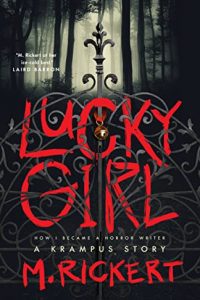Paula Guran Reviews Short Fiction: Shimmer, Uncanny, and Black Static
 Shimmer 5/18
Shimmer 5/18
Uncanny 5-6/18
Black Static 5-6/18
The regular venues this column covers had quite a bit to offer as spring turned to summer. Shimmer went spooky with all four stories in their 43rd issue. Katherine Kendig‘s “What the Skeleton Detective Tells You (while you picnic)” is dark “lite”: a cute reworking of a private eye yarn with a living skeleton detective. “You, In Flux” by Alexis A. Hunter is a flash piece about a woman definitely changed by childbirth. Both are okay, but the issue’s other two stories are standouts.
Anya Johanna DeNiro skillfully weaves a fresh tale from Nordic myth in “Faint Voices, Increasingly Desperate“. Although others see it as punishment, Freia yearns to live among mortals and is happy to return to Vienna as she has countless times before. This time it is 2018, an “Age of Blood like no other.” No matter the era, mortals who get involved with immortals shouldn’t, and gods are cruel even to their own. A spellbindingly dark must-read.
Octavia Cade has a knack for originality and her “Gone to Earth” is more proof of it. All three of the first astronauts on Mars experience Earthsickness. As awe-inspiring as the red planet is, “the sheer towering emptiness of the place was something to shrink from, not to fill up.” Back on Earth, the difference between the dead planet and the living one is still unnerving. They try to reconnect to their home planet, but the trauma is overwhelming and, as no one else has ever suffered from the ailment, there is no treatment. Cade’s story is uncomfortable and unsettling and another one not to miss.
Uncanny for May features five short-to-very-short stories. The new mother in Naomi Novik‘s little gem of a fairy tale, “Blessing“, has done everything she can to assure at least one blessing from the fairies for her firstborn. You know how drunk fairies are; next thing you know baby Grace has too many blessings to be truly blessed. Not exactly dark, although what comes after the story’s end may be dark and bloody.
The modern age has changed things for a lust-feeding succubus in “Sucks (to Be You)” by Katharine Duckett. With social media and porn and love stories “crammed into every oversaturated bit” of our brains, her job is “half done” before she meets you. However, “this new world is half real, half simulation” and it can be difficult for a succubus not to be ensnared herself. There are depths and perils in this story: it makes you think.
“What Gentle Women Dare” by Kelly Robson portrays Lolly, a whore, barely surviving on the streets of 1763 Liverpool. She comes into possession of a miraculous piece of clothing that makes her “feel clean. Stainless. Prideful.” It leads to a fateful conversation with a most unusual woman in a graveyard. Robson paints a suitably dire picture of the era, a reminder that women’s history is dark indeed. Apt to make those who possess Y-chromosomes quite uncomfortable.
“If We Die Unjustified” by A. Merc Rustad is also set in the past, this one torn by bloody revolution. Told from the point of view of a little girl’s loyal dog, it is as condemning of humankind as the Robson story, but a bit more determinative of consequences. It is nothing like Harlan Ellison’s classic “A Boy and His Dog,” except the dog here is telepathic (in a non-science-fiction fantasy way) – however, Rustad’s tale still brought it to mind. A girl loves her dog. And a dog loves his girl.
“The Cook” by C.L. Clark is flash fiction set in a more nebulous past, one nevertheless full of war. Can’t say much about it except that a soldier falls in love with an inn’s cook. Marina J. Lostetter‘s “Discard the Sun, for It Has Failed Us” is about far-future humanity keeping faith in the dying star that gave them life. Quite short and quite poignant.
All five stories in Black Static #63 are worth reading. The first-person narrator of Stephen J. Dines‘s novella, “The Harder it Gets, the Softer We Sing,” is a driven, less-than-successful writer. Writing “rules” are used as section headers, then intentionally broken. This conscious literary-ness, along with clever wordplay and genuine craft, make a bit more of a story of a family surviving the vicissitudes of life than it really is. One element – the mother/wife’s substitution for her miscarried baby – did not work for me, but it is still an effective tale.
“Raining Street” by J.S. Breukelaar also features a writer, Rebel, but she’s less driven, less successful, and more grief stricken than Dines’s character. Widowed, struggling to make ends meet and rear two children alone, she decides – after an odd neighbor encourages her – to take a day trip to the city where better, more affordable groceries can be found. The outing turns into a strange and dark journey, but Rebel’s fortitude provides the reader with hope. Breukelaar makes an enduring impression.
Sandvik, a doctor who has evidently not completed his education, attends a prison-island infirmary during a seemingly never-ending war in “Bones of Flightless Birds” by Matt Thompson. A painful, unknown illness begins to take a deathly toll of the internees, but Sandvik discovers that what happens to the victims’ bodies is even more dreadful than the disease. Thompson eschews both moralizing and elucidation, consequently maximizing the story’s impact.
“Pyralidae” by Kristi DeMeester is fairly straightforward, but still nicely atmospheric. With her father’s death, Josephine Burke inherits the family orange grove. The mature woman moves there, abandoning a relationship and accepting her new life. Thanks to a shipment of an experimental form of natural pesticide and an unwelcome visitor from her recent past, she learns exactly how to live her new life as her father’s daughter.
Similarly, “And the Fire and the Stag” by Nicholas Kaufmann lacks writerly pretense. Thanks to a raging wildfire, Kenneth learns at age eight just how merciless nature is. Thirty-four years later, he’s grown up to be a chronically depressed man who avoids the great outdoors and still relies on April, his responsible, dependable anthropologist older sister. Then April vanishes in a sprawling Virginia forest. Despite his dendrophobia, Kenneth takes off after her. He conveniently finds her campsite (something that has eluded the professional searchers), then inconveniently loses his cell signal. In the tent, he conveniently discovers his sister’s diary that provides the background to the story – she’s searching for the truth about a “lost tribe” of “The Strange People Who Came Out of the Forest” – before the weirdness responsible for his sister’s disappearance sucks him in, too. Despite the typical horror tropes, Kaufmann has penned a vivid, nightmarish story.
Paula Guran has edited more than 40 science fiction, fantasy, and horror anthologies and more than 50 novels and collections featuring the same. She’s reviewed and written articles for dozens of publications. She lives in Akron, Ohio, near enough to her grandchildren to frequently be indulgent.
This review and more like it in the August 2018 issue of Locus.
 While you are here, please take a moment to support Locus with a one-time or recurring donation. We rely on reader donations to keep the magazine and site going, and would like to keep the site paywall free, but WE NEED YOUR FINANCIAL SUPPORT to continue quality coverage of the science fiction and fantasy field.
While you are here, please take a moment to support Locus with a one-time or recurring donation. We rely on reader donations to keep the magazine and site going, and would like to keep the site paywall free, but WE NEED YOUR FINANCIAL SUPPORT to continue quality coverage of the science fiction and fantasy field.






